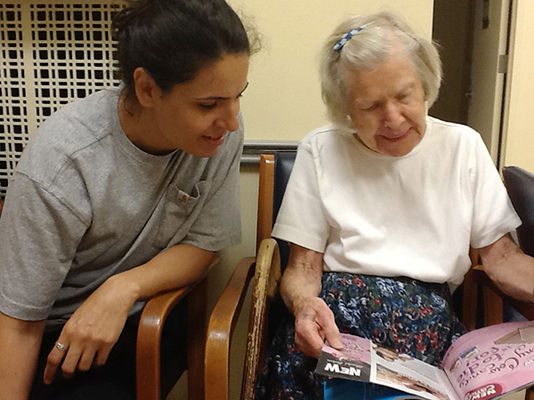Editor’s note: Mary Jane Koren, MD, MPH, is providing program consulting to The John A. Hartford Foundation, after retiring in 2013 as Vice President of Delivery System Reform at the Commonwealth Fund.
My mother recently celebrated her 100th birthday, a milestone event which caused me to reflect on the The John A. Hartford Foundation’s vision of creating a social movement to make high-quality, humane care the norm for older adults. As a geriatrician, state policymaker, and in my role at The Commonwealth Fund, I’ve had many years of professional experience that directly relate to The John A. Hartford Foundation’s three priority areas: the creation of an age-friendly health system, support for family caregivers, and improved care for older adults with serious illness or at the end of life.
But my personal experience also shows why these three priority areas are vital to people like my mother, as well as me—one of the more than 18 million family caregivers of older adults in this country. My mother’s story illustrates both the importance of these priorities and their interconnectedness.
First, you need to know that my mother has refused a hearing aid despite her considerable difficulty hearing. Communication between herself and her primary care providers is, to say the least, challenging. To track the progression of her mild-moderate Alzheimer’s Disease, she is tested with a typical mental status test at each of her visits. Each year, her scores have trended downward.
At one recent visit, however, we brought with us a small, inexpensive device that amplifies sound (cost: about $30) and a set of cheap headphones (about $20), which enabled her to clearly hear the questions on the mental status test. To everyone’s surprise, her score showed a 10 percent improvement over what it had been a year earlier when she was screened without the amplifier.
Shouldn’t facilities that care for older adults, 50 percent of whom have problems hearing by the time they are 75, routinely have a way to amplify sound so patients can hear what’s being said? For patients and their caregivers, age-friendliness is manifested in the details.
This same example of a low-cost, low-tech intervention that has the capacity to make the health care delivery system even that tiny bit more age-friendly also has implications for another of The John A. Hartford Foundation’s priorities: to improve care for those with serious illness and at the end of life.
We often think of those at the end of life as being in dire straits from end-stage diseases, but the reality is far different. My mother, for example, enjoys excellent health and still goes to the gym every day. For older adults still in good health, now is the time to plan for the inevitable. Yet, until my mother could hear what her primary care providers were saying and we could talk to her without shouting, she was unable to have a meaningful discussion about her wishes for care even as she is, literally, approaching the end of her life.
Now, thanks to the simple listening device, my mother has been able to engage in a conversation with her primary care provider and myself, designate a health care proxy, and sign a POLST form. That means the chances that her wishes for care will be honored have improved significantly. Her doctor knows how aggressive she wants him to be and can be responsive to, and respectful of, her preferences.
Recognizing the critical role that family caregivers play, The John A. Hartford Foundation is committed to transforming the delivery system to meet the needs of people who, like myself, are caring for someone. All too often, families are unaware of what’s important to a relative or what their choices would be, forcing them to make difficult decisions at a time of crisis, but in an informational vacuum. Again, the device that allowed my mother to understand and communicate her care wishes has also helped me, as her caregiver, by providing clarity, in written form, of her preferences, which relieves me of the burden of uncertainty.
Creating an age-friendly health system may appear to be an overwhelming task, given the sheer number of health care providers in the U.S. and the incredible complexity of the health care delivery system. Nevertheless, the old adage that the best way to eat an elephant is one bite at a time applies to health system change.
Rather than trying to do everything at once, there are innumerable small actions that can be taken that start to make care better for older adults. Taking one bite at a time will ensure that the care people receive when seriously ill or near the end of their lives reflects their values and addresses their concerns, while also easing the anxiety and stress on caregivers so they can embrace their role.

